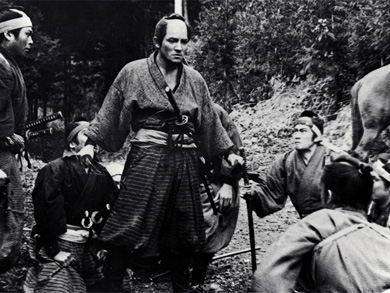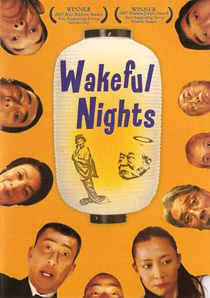Man oh man, I have not seen a film with this level of graphic violence in quite awhile. Folks are shot, stabbed, strangled, bludgeoned, impaled, dismembered, disemboweled, suffocated (one chick is even dispatched via toilet bowl), all with a stylistic verve and pace that makes you squirm with a kind of sick fascination (or is it just me?). Here is ultraviolence done right; timing, camera angle, special effects -- everything comes together in a kind of gruesome harmony. A blood-spattered tour de force!
The story is somewhat less well-executed. It's told in flashbacks, intercut with the real-time killing spree of one woman, pretty Sheung Cheng-lai (Josie Ho). The flashbacks jump back and forth to scenes throughout Cheng's life, from her childhood living in a rundown apartment building (from which she and her family are eventually driven out to make way for high-rise construction) to the present. As a child, little Cheng had a grandpa who always wanted a place by the harbor, and the girl vows to make that happen some day. This promise becomes an obsession throughout her life and, when thwarted, turns her into a homicidal maelstrom of creative, tool belt-oriented violence in the very apartment she'd tried so hard to acquire.
Here's the rub: The indignities Cheng has suffered don't quite compensate, story-wise, for her rampage. Look, I get it; Cheng represents the oppressed working class, taking sweet revenge on those privileged bastards in the towers: the golf club-toting business man, the drug-addled libertines, the spoiled housewives. Perhaps if Cheng had been shown being personally victimized and violated by such types, the story would have worked better; traditionally, in films of this sort, she would have had far more heinous things done to her to bring about such a transformation. As it is, we spend so much time with her in the flashbacks, seeing her as a nice, normal person, that the sudden shift into special ops-style killing machine -- well, it's a bit of a *clank*.
Don't get me wrong, this doesn't ruin the film or anything -- just a weakness which may or may not be my own personal niggle. Other than that, it's a great picture that offers much more than just a lot of blood and entrails and a guy getting killed with a bong (you'll see). There is a dark humor that runs through the piece, as well as social commentary and topical relevance (the film came out in 2010 and is very aware of it's moment in light of the then-recent global economic downturn).
Star Josie Ho was also a producer on the film, her first outing as such. She was reportedly interested in doing a horror picture (as it is the perennial cash cow of film genres). She took one look at the legendary The Story of Rikki (see my review in Asia Shock) and decided that was the direction she wanted to go in. The influence is not undetectable …
Dream Home is one of those films that's been sitting in my to-watch pile for some time -- the kind you finally screen and slap yourself for not watching sooner. And don't think I've spoiled it for you; there's lot's of stuff I've (deliberately) not mentioned, and a lovely twist ending I'm sure you'll enjoy. So put on your best blood-resistant raincoat, get some popcorn, and get ready to get your gore on!




